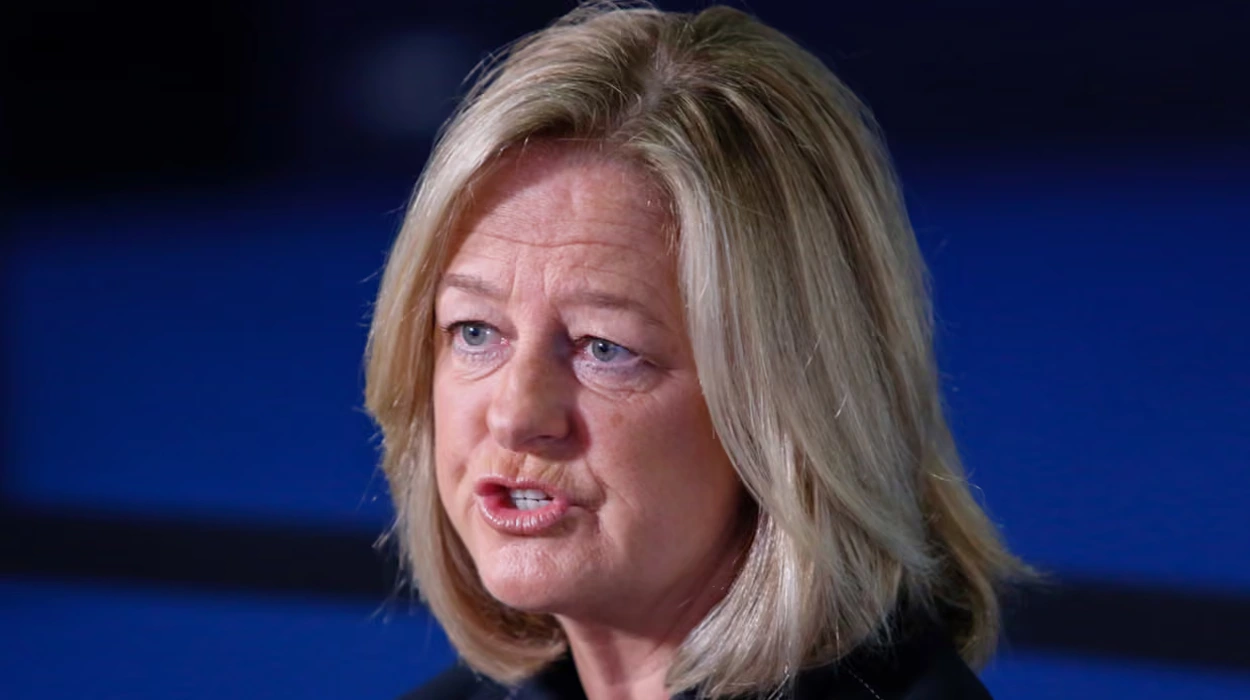London (Parliament Politics Magazine) – BT CEO Allison Kirkby says UK telecoms face government costs 10x higher than Europe, warning the industry is at “peak” costs ahead of November’s budget.
As reported by The Guardian, BT’s chief executive warned that telecom operators in Britain pay as much as ten times the government-imposed costs seen in comparable European nations.
What did Allison Kirkby say about UK telecoms and government costs?
Allison Kirkby warned that British telecoms have reached the “peak” of government-imposed costs and said the upcoming November budget could prove “very difficult” for Chancellor Rachel Reeves.
Addressing the Connected Britain conference in London on Wednesday, she said,
“We pay in business rates, energy levies and other costs associated with regulation and compliance 10 times the amount our peers pay in countries like Germany and the Netherlands.”
Ms Kirkby stated,
“So we’re already at peak government-inflicted costs.”
The BT CEO, also a Board of Trade adviser, called for planning reforms to ease the delivery of major infrastructure projects.
She becomes the newest business figure to increase pressure on the government ahead of the budget.
How BT faces rising costs while investing £15bn in UK networks?
Referring to last year’s budget, BT said the increase in employers’ national insurance and minimum wage added £100m to its expenses.
The company revealed in 2023 that it hopes to shrink its 130,000-strong global workforce to 75,000–90,000 by 2030 as part of a cost-cutting strategy.
About 80,000 people work for BT in the UK. The firm is investing around £15bn in 5G and full-fiber networks across Britain, with Openreach managing the latter.
What did Dave Ricks and CS Venkatakrishnan say about UK costs and taxes?
On Wednesday, Dave Ricks, chief executive of US pharmaceutical firm Eli Lilly, said the UK is “probably the worst country in Europe” for medicine prices.
The comments follow reports that major pharmaceutical companies have scrapped or delayed around £2bn in planned UK investments so far in 2025.
CS Venkatakrishnan, chief executive of Barclays, urged the government to curb public sector pay increases and not impose additional taxes on banks.
What did the Resolution Foundation say about national insurance and the budget?
The Resolution Foundation, with close ties to government leaders, suggested the Chancellor reduce National Insurance by 2p and move it to income tax.
The think tank said most working people would see little change, while pensioners, landlords, and the self-employed could face an extra £6bn in taxes.
Adam Corlett, an economist at the Resolution Foundation, added,
“Policy U-turns, higher borrowing costs and lower productivity growth mean that the Chancellor will need to act to avoid borrowing costs rising even further this autumn. Significant tax rises will be needed for the Chancellor to send a clear signal that the UK’s public finances are under control.”
Which pharma companies have scrapped or paused UK projects?
- AstraZeneca – Paused £200m research lab in Cambridge (1,000 jobs).
- MSD (Merck in the US) – Scrapped £1bn London research center (125 jobs).
- Eli Lilly – Paused London Gateway Lab, part of £279m investment.
- Haleon – Closing Maidenhead site (435 jobs).
- Indivior – Delisted from the London Stock Exchange.
- Verona Pharma – Sold to MSD after LSE delisting in 2020.
Key facts about the UK’s upcoming budget
The Budget will be presented on 26 November 2025 at 12:30 PM, focusing on reducing debt amid slower growth. Speculated tax changes target pensions, property, wealth, and inheritance, while basic rates remain unchanged.
Possible reforms include pension relief for high earners, capital gains or National Insurance on rental income, and limits on gifts or property reliefs. The government aims to meet fiscal rules without raising taxes for working people.


